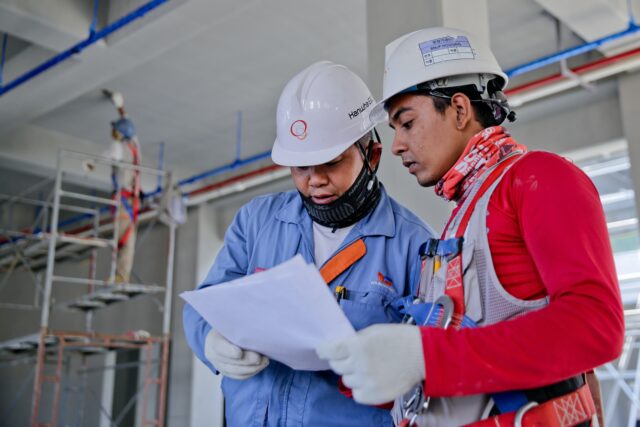
There are many specializations in civil engineering with different topics and goals. Students must choose an area of study as their major to acquire specific training and prepare for a future career.
With some basic knowledge of civil engineering specializations, students can choose a career path that meets their preferences and career goals. However, before delving into the types of civil engineering, let’s first take a look at its education and skill requirements:
Civil Engineering Education And Skills
A civil engineer’s education begins with a rigorous curriculum focusing on the practical application of mathematics and science. Students must develop many skills during their studies, including problem-solving, decision-making, and leadership.
Civil engineering graduates typically begin their work in the role of engineers in training. After passing the national examination and completing a state’s work experience requirements under the guidance of a Professional Engineer, the candidate is eligible for the title of Professional Engineer.
These professionals work with the public, in municipalities, and on construction sites. Effective communication is crucial to their role since they work in different environments and with different groups and individuals.
Civil engineering programs are often competitive and selective; students typically desire master’s degrees to advance their careers. But the hectic schedules associated with students’ current jobs often prevent them from enrolling.

Fortunately, there are many universities today that offer a degree of masters in civil engineering online. These courses are designed to expand students’ knowledge in the technical, scientific, and mathematical areas of civil engineering. Additionally, they are designed to improve management abilities so that civil engineers can pursue more opportunities in their field.
Types Of Engineering Specializations
Civil engineering encompasses many subfields and is generally concerned with constructing physical and artificial structures. Throughout this article, you’ll learn about the seven primary types of engineering specializations:
1. Structural engineering
Students studying structural engineering are taught how to design large structures and maintain their functionality during high winds and catastrophes like earthquakes. Structures are studied for their gravitational properties to estimate their weight-bearing capacity, which allows for the creation of support mechanisms such as beams and pillars.
Students in these fields should take courses in other physical science topics, such as kinetics, airflow, and shock waves. Upon graduation from a program, students may specialize in building, bridge design, or aircraft engineering.
The following are examples of projects that a structural engineering graduate might undertake:
- Bridge architecture
- Site evaluation
- Home enhancements
- Foundation construction
- Automobile and airplane design
- Skyscraper architecture
2. Construction engineering and management

Through this specialization, students can gain knowledge of construction principles, code requirements, and project operation steps. As part of their studies, they learn how to manage a project’s resources and materials and build a safe, practical, and sustainable building.
Furthermore, students learn how to organize each step of the construction process, create a schedule, keep track of materials, and develop a budget. They learn to prepare a management program that often emphasizes building information modeling (BIM). Engineers can use this technology to provide better visibility, improved decision-making, and sustainable cost-saving options for many projects.
These are some examples of building projects a construction engineering and management graduate might undertake:
- Residential buildings
- Businesses and commercial buildings
- Highways, roads, and bridges
- Plants for treating water
- School locations
- Hospital environments
3. Geotechnical engineering
Geotechnical engineering involves studying rocks, soil, and artificial materials supporting systems. For example, a graduate might coordinate the construction of an underground mining facility. Students studying geotechnical engineering should become familiar with the chemical properties of earth materials since different rock types require different construction techniques.

During their studies, students learn about water and soil reactions, how to construct concrete structures, and determine whether a natural slope can support an additional load.
Graduates in geotechnical engineering can work on the following projects:
- Reservoir systems for water tanks
- Tunnel systems for sewers
- Roads and pavements
- Natural embankments
- Restoring historical monuments
- Testing and sampling of soil
4. Environmental engineering
In environmental engineering, students study how to minimize the overall impact of artificial systems on the natural environment and maximize the use of natural resources. It is usually their job to study the chemical composition of water, soil, and air to develop technical solutions to pollution problems.
When they graduate, they will be able to assist companies in improving their sustainability and provide environmental policy advice to legislators. Their projects often produce green or renewable energy from natural sources like sunshine or water.

Here are some examples of projects for an environmental engineering graduate:
- Managing solid waste
- The recycling system
- Water processing
- Flows and drainage systems
- Crop irrigation
- Facility inspection
5. Transport engineering
Infrastructure is developed to facilitate people’s movement to and from locations safely and conveniently, including pathways.
Transportation engineers study how networks are designed for transportation routes, such as railroads, subways, seaways, and airways.
Students also learn how to modify natural environments for transportation, such as building an artificial canal. Physical science properties are typically studied in coursework, including application force and lateral force, examining how earthquakes or wind storms affect the durability of a system.
The following are a few examples of projects that a transportation engineering graduate might complete:
- Airport architecture
- Traffic observing systems
- Developing automated public transit
- Pedestrian path development
- Road access management

6. Water resources engineering
The field of water resources engineering deals with developing safe drinking water infrastructure in cities and towns. Students study the hydrologic cycle, the movement of water molecules between the earth and the atmosphere. With this knowledge of natural systems, they can construct water sanitation facilities and create artificial lakes and ponds.
This field also includes hydraulics, which describes how water flows in pipes and channels under the influence of natural forces.
Here are a few examples of projects a water resources engineering graduate could work on:
- Water irrigation systems
- Water distributing stations
- Fishing infrastructure
- Waterways
- Plant nursery
- Flood prevention facilities
7. Materials engineering

A construction specialist studies all materials and components of a construction project, such as wood, steel, and concrete. Additionally, they may study stones, sand, plastics, and fabrics, as required by their university programs.
A materials engineering student learns the chemical properties of the above items, enabling them to select materials with the most desirable properties or modify them at the atomic level. For example, a professional might assess how well a component conducts electricity or handles heat.
These graduates can work on many projects since most engineering projects require some material. The following are some examples of materials engineering projects:
- Cement blending
- Spacecraft construction
- Welding techniques
- Clothing design
- Sunscreen manufacturing
- Biodegradable material products
Conclusion:
There is no doubt that civil engineering is one of the most important engineering fields in the world. No matter what type of civil engineering career you choose, it is imperative to prepare yourself with the relevant education and skills.
If you are still deciding which specialization in civil engineering to pursue, reviewing the curriculums will help you decide your course of study. After completing your degree, you can advance in this field with extensive expertise and knowledge.






